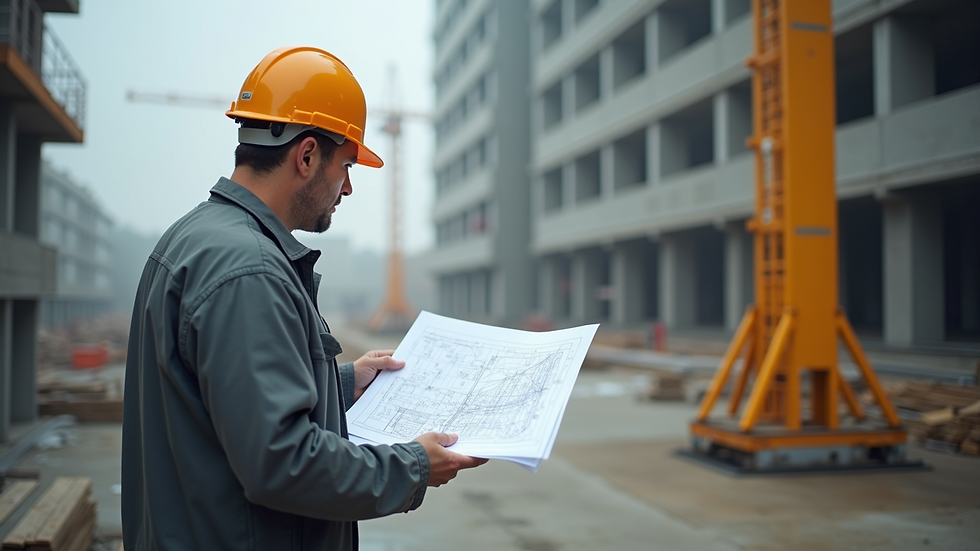Ensuring Quality Through Third-Party Inspections
- tbergmann3518
- Sep 16
- 3 min read
Quality construction inspections are essential to guarantee that building projects meet required standards and client expectations. These inspections provide a systematic approach to identifying potential issues early, ensuring compliance with regulations, and maintaining structural integrity throughout the construction process. This article explores the importance of quality construction inspections, practical methods to implement them, and how they contribute to successful project outcomes.
The Importance of Quality Construction Inspections
Quality construction inspections serve as a critical checkpoint in every phase of a building project. They help detect defects, verify materials, and confirm that workmanship aligns with design specifications. Without thorough inspections, projects risk delays, increased costs, and compromised safety.
For example, during the foundation phase, inspections verify soil conditions and concrete quality. If these elements are not properly assessed, structural failures may occur later. Similarly, inspections during electrical and plumbing installations ensure systems function safely and efficiently.
Implementing regular inspections also supports compliance with local building codes and industry standards. This compliance is not only a legal requirement but also a safeguard for property owners and developers, reducing liability and enhancing the value of the completed structure.

Best Practices for Conducting Quality Construction Inspections
Effective quality construction inspections require a structured approach. The following best practices help maintain consistency and thoroughness:
Develop a Detailed Inspection Plan
Outline specific checkpoints for each construction phase. This plan should include criteria for materials, workmanship, safety, and regulatory compliance.
Use Qualified Inspectors
Employ inspectors with relevant certifications and experience. Their expertise ensures accurate assessments and credible reports.
Document Findings Clearly
Maintain detailed records of inspection results, including photographs and notes. Clear documentation facilitates communication among stakeholders and supports decision-making.
Schedule Inspections at Critical Milestones
Conduct inspections at key stages such as foundation completion, framing, mechanical installations, and final walkthroughs. Timely inspections prevent issues from escalating.
Implement Corrective Actions Promptly
Address any deficiencies immediately to avoid project delays and additional costs.
By following these practices, construction teams can uphold high standards and deliver projects that meet or exceed expectations.

Leveraging Third Party Inspections for Objective Quality Assurance
Engaging third party inspections introduces an independent perspective to the quality assurance process. These inspections are conducted by external experts who are not involved in the construction project, ensuring unbiased evaluations.
Third party inspections offer several advantages:
Impartiality: External inspectors provide objective assessments free from internal project pressures.
Specialized Expertise: They often possess specialized knowledge in areas such as structural engineering, materials testing, or safety compliance.
Enhanced Credibility: Independent reports increase confidence among stakeholders, including lenders and regulatory agencies.
Risk Mitigation: Early detection of issues reduces the likelihood of costly rework or legal disputes.
For instance, a developer may hire a third party inspection firm to verify that a commercial building’s fire suppression system meets all safety codes. This independent verification can be crucial for obtaining occupancy permits and insurance coverage.

Integrating Quality Inspections into Project Management
Incorporating quality construction inspections into the overall project management framework enhances coordination and efficiency. This integration involves:
Aligning Inspection Schedules with Project Timelines
Ensure inspections are planned alongside construction milestones to avoid conflicts and delays.
Facilitating Communication Between Teams
Share inspection reports promptly with contractors, subcontractors, and owners to enable swift responses.
Utilizing Technology
Employ digital tools for real-time reporting, issue tracking, and documentation storage. Mobile apps and cloud platforms streamline inspection workflows.
Training Project Personnel
Educate team members on inspection requirements and quality standards to foster a culture of accountability.
By embedding inspections into project management, teams can maintain momentum while safeguarding quality.
The Long-Term Benefits of Rigorous Quality Construction Inspections
Investing in quality construction inspections yields significant long-term advantages. These include:
Improved Structural Integrity
Buildings constructed with verified quality are more durable and safer for occupants.
Cost Savings
Early identification of defects reduces expensive repairs and project overruns.
Enhanced Reputation
Consistently delivering high-quality projects strengthens relationships with clients and partners.
Regulatory Compliance
Meeting or exceeding code requirements minimizes legal risks and facilitates approvals.
Sustainability
Quality inspections support environmentally responsible construction by ensuring efficient use of materials and adherence to green building standards.
Ultimately, these benefits contribute to the creation of projects that are both structurally sound and personally meaningful.
Quality construction inspections are indispensable for successful building projects. By adopting best practices, leveraging independent expertise, and integrating inspections into project management, stakeholders can ensure that every phase of construction meets the highest standards. This approach not only protects investments but also fosters trust and confidence in the built environment.



Comments